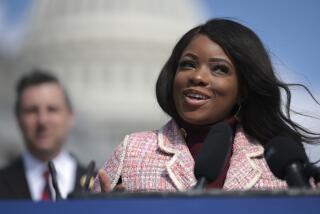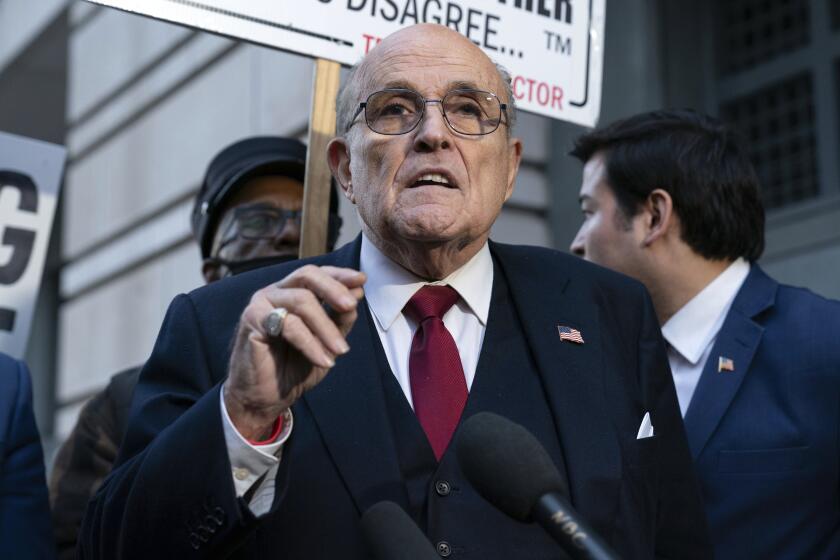GOP Launches Gentle Battle on Environment
Barely two years ago, the Republican Congress appeared well on its way to rolling back a quarter-century of environmental legislation.
With great fanfare, the GOP majority celebrated opening the national forests to logging, moved aggressively to scale back clean-water programs and tried to rein in the federal government’s primary pollution fighters. The Environmental Protection Agency, in the words of House Republican Whip Tom DeLay of Texas, was “the Gestapo of government.”
But listen to the GOP now. Chastened by a tide of public opinion against their agenda, Republicans are no longer bashing environmental laws and, in fact, are often heard speaking of their respect for the environment.
Yet their language masks a reality: Behind those gentler words, the Republican majority is still working hard to relax or abolish many environmental regulations.
“Two years ago they were lined up shoulder to shoulder, with muskets firing away at 25 years of environmental law,” said George Frampton, who recently resigned as assistant secretary of the Interior specializing in public lands. “They took too many casualties. Now they’re firing from behind rocks, still trying to put some pretty big holes in the environmental framework.”
Republicans agree that they have changed their strategy, although they insist that they are trying to bring more balance and common sense to environmental regulations--not rip holes in them.
In his speech to the National Cattlemen’s Beef Assn., Sen. Larry E. Craig (R-Idaho) said he has “adjusted [his] language,” stepping away from talk about “changing or reforming” environmental regulations that the public already considers beneficial and is instead talking about “modernizing and improving” the rules.
Many of the targets remain from past encounters: legislation and regulations that protect endangered species and ancient timber, measures that limit dune buggies and self-propelled water skis in public wilderness, and restrictions on accessing oil resources hidden beneath the fragile frozen crust of the Arctic National Wildlife Refuge in Alaska.
*
The focus of Republican efforts is expected to be natural resources--legislation that often protects fuzzy creatures but at the expense of the rights of property owners. At the same time, Republicans are likely to avoid major revisions to legislation limiting pollution.
A significant reason for distinguishing between the two: Pollution in the form of dirty air or water affects nearly everyone, particularly in large population centers. Tinkering with that legislation has in the past led to broad public opposition.
But the protection of resources on federal lands or of endangered animals are ideals that touch comparatively few people directly, and the support is not as strong.
“There is a nexus between environmental pollution and human health. People can perceive that,” said Rodger Schlickeisen, president of Defenders of Wildlife.
Among the proposals likely to be at the center of debate are measures that would:
* Amend the 21-year-old law governing the 155 national forests. The legislation is still in the draft stage but is expected to include provisions that would step up logging while reducing opportunities for environmental appeals of U.S. Forest Service timber-cutting plans.
* Allow local authorities to repair river levees, a process that can involve large construction, without submitting plans for environmental review. Critics fear that such work could damage wildlife and plant habitat and that the legislation would sidestep Endangered Species Act protections.
* Create a temporary nuclear waste storage site at Yucca Mountain in Nevada. Critics fear that the site would eventually become permanent, attracting radioactive garbage that would be routinely transported across the country.
* Increase timber cutting in Alaska’s Tongass National Forest, the only remaining temperate rain forest in North America.
* Prohibit the president from acting alone--without congressional approval--to invoke a powerful tool known as the Antiquities Act to protect areas of federal land larger than 5,000 acres. The act provided the basis for the initial protection of the Grand Canyon, Grand Teton National Park and millions of acres in Alaska.
Last year, President Clinton invoked the act to create the 1.7-million-acre Grand Staircase-Escalante National Monument in Utah out of a red-rock wilderness. The decision appears to have extinguished plans for massive coal mining in the area.
In addition, a renewed effort is underway to overhaul the long-troubled Superfund program that was created nearly two decades ago to clean up the nation’s most polluted toxic dumps. Critics of the Republican proposal, including EPA Administrator Carol Browner, fear that it will steer the Superfund effort away from the administration’s goal of having the cleanups paid for by those most responsible for creating serious pollution, and not by the federal government.
Perhaps the greatest Republican focus will be on an issue that may never come to a vote: the administration’s plan to establish toughened air pollution standards, redefining the concentrations of particles and ozone--soot and smog--that are deemed unhealthful.
Proposed standards, to be made final by July 19, have drawn sharp criticism from some in Congress and from a coalition of manufacturers and small businesses facing increased costs if forced to comply with regulations that could follow.
The criticism is intended to pressure the administration to modify its plan--a step that would allow Congress to avoid dealing with it in a direct up-or-down vote. Opponents, concerned that if they vote against the plan they would be portrayed as being anti-environment, prefer to have the administration submit a plan they can approve.
*
The about-face in Republican language about the environment is perhaps no better demonstrated than by DeLay. When asked during the previous Congress whether he wanted to keep any of the federal regulations that are a mainstay of the government’s environmental program, he replied, “Not that I can think of.”
Now he is talking about cooperating with Democrats on the environment, and he says the “good government” issues involved can be addressed most effectively at the local level.
House Speaker Newt Gingrich (R-Ga.) recently made a rare floor speech spotlighting Republican goals for the environment. “I used to teach environmental studies,” Gingrich said as he called for protection of the planet’s diverse species, as well as its air and water.
What has prompted the change in strategy?
Political reality, say congressional Republicans, Democrats and others keeping tabs on the progress of environmental legislation.
Surveys of voters in November “showed that the American people were very concerned about the handling of environmental matters by the Republicans,” Sen. John McCain (R-Ariz.) said in an interview.
Predicting more compromise on the part of his Republican colleagues this year and next, he said: “There certainly is an increasing resistance to being on record with a vote that is seen as being anti-environmental.”
Particularly telling are the findings of Republican surveys and the findings of a group opposing tougher environmental regulation:
* The American Viewpoint National Post-Election Survey, conducted by Republican pollster Linda DiVall immediately after the 1996 election, found that 24% of those surveyed picked the environment as the single factor that caused their greatest reservations about Republican control of Congress. That is twice as high as the second-ranking reservation: education.
* Another Republican poll, conducted by Fabrizio McLauglin & Associates, found a majority supported the idea that government should “do what it takes for clean air and water,” while less than half agreed that “strict regulation hurts business and costs jobs.”
* Citizens for a Sound Economy, a business-affiliated organization that is aggressively pressing the Clinton administration to step back from the strict new air pollution standards, has notified its allies that 42% of voters “believe Republican efforts to reform environmental laws are motivated by their desire to make it easier for business to increase profits.”
The organization says it is important to “understand who you’re talking to,” noting that 76% of Americans consider themselves “environmentalists” or “pro-environment.”
In Frampton’s view, the polls suggest that the Republicans who were swept to power in 1994 overestimated “the extent to which the public . . . voted for environmental deregulation. People may be concerned about over-regulation in some areas, but the environment was not one of them.
“Even the Clinton administration didn’t realize how popular environmental protection was, until late ’95 and early ‘96, and they made it one of the four horsemen of the campaign, or of the campaign rhetoric at least,” he said.
In a memorandum to the Sierra Club and the League of Conservation Voters, pollsters Stanley B. Greenberg, who is one of Clinton’s poll takers, and Alan J. Quinlan said that, on the basis of their study of the impact of the environmental issues on the 1996 congressional election, “anti-environmental candidates paid a big price for their actions.”
“In the two years since the country saw its most aggressively anti-environmental Congress, the environment has moved from simmering on the back burner to boiling on the front,” they wrote.
More to Read
Get the L.A. Times Politics newsletter
Deeply reported insights into legislation, politics and policy from Sacramento, Washington and beyond. In your inbox three times per week.
You may occasionally receive promotional content from the Los Angeles Times.






